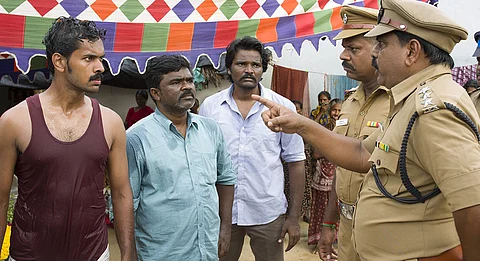
- Reviews
- Power List 2024
- Cannes 2024
- In-Depth Stories
- Web Stories
- News
- FC Lists
- Interviews
- Features
- FC SpecialsFC Specials

Language: Tamil
Director: Amshan Kumar
Cast: Rajeev Anand, Manimegalai
The central event in Amshan Kumar's Manusangada finds an ironic counterpoint in 'Samarasam Ulaavum Idamey', the Seerkazhi Govindarajan hit from Rambaiyin Kaadhal (1956). The song speaks of death being the great leveller, that people who are differentiated by caste and class while they are alive are finally united in the graveyard, where everyone's equal. These words are sung, in this film, by Gowthaman (Sethu Darwin), a big shot from Ammaiyappan village, in Chidambaram. He has come with Kolappan (Rajeev Anand) to Chennai, to file a writ petition in the High Court. The dominant-caste people in their village won't allow Kolappan to use the common path (podhu paadhai) to take his father's body to the burial site. As with earlier oppressed-caste deaths, they want Kolappan to use the roundabout way, the thorny, uncleared path (kaattu vazhi paadhai). When Gowthaman sings 'Samarasam Ulaavum Idamey' on their way back from Chennai, he begins with a smile and then chokes up. He probably realises these powerful lyrics don't mean a thing in the real world.
Manusangada opens with Kolappan receiving news of his father's death, and heading to his village. (He works in a steel company in Chennai.) From the bus, he speaks to his brother-in-law. Part of the conversation is about logistics, arranging for a freezer box and so forth. And then, Kolappan says, "Dukkam oru pakkam. Enna nadakkumo nu kavalai oru pakkam." (I'm worried about what might happen.) After reaching his village, Kolappan turns defiant. Despite repeated promises from the MLA — after every death — that things will be different the next time, Kolappan knows nothing will change. He goes to the cops to ask for protection en route to the burial site. They send him to the Revenue Divisional Officer, and he makes the same request there. Soon, he decides he's had enough. That's when Gowthaman — whom the locals call "annan"; he's an older brother-like figure who resolves disputes unofficially — says they should go to the Madras High Court, where he knows a lawyer…
What follows is a quietly idealistic stretch. The lawyer drafts a petition: "Forcing my client against the use of common pathway is nothing but practising untouchability, which got abolished as per Article 17 of the Constitution of India…" As Gowthaman and Kolappan wait for the court to open for the day, they have breakfast. Filled with righteousness about the procedural correctness of how they are handling things, Gowthaman says, "We have to fight for what is right. Otherwise, what is the difference between us and them?" What's left unsaid is that he is eating alongside Kolappan, at the same table. Manusangada is the rare film that paints the city as a place of (relative) equality. When Kolappan receives news of his father's death, his roommates offer money, support. One of them even offers to drive him to his village, which is four hours away, a place where even the bus won't stop unless you request the conductor.
The lawyer refuses to take money for his services. The judge — not marked as a member of the dominant caste, but most likely belonging to one — dismisses the government pleader's wishy-washy argument that this could become a law-and-order problem. Kolappan's fiancée, Revathy (Sheela Raj Kumar), tells him that she's read about these things in the papers, but until she joined him in the village, she had no idea it was really so bad. Kolappan replies, "You are from the city. There, it is not so open." But back home, as his mother (Manimegalai) wails, things get worse. No one cares about the court order, not the dominant-caste people, not the cops. With his family and friends, Kolappan embarks on a protest, never mind that it's been two days since the death and the body remains in the freezer box.
Amshan Kumar is a documentarian. He won a National Award for Yazhpanam Thedchanamoorthy: Music Beyond Boundaries, and his first feature film — Oruthi (Manusangada is his second) — was a nineteenth-century tale whose protagonist was a Dalit woman. He works in a prosaic, straightforward fashion. He doesn't preach. The problems with Manusangada have more to do with scale. The handheld camera is certainly a dramatic filmmaking tool (its immediacy is unmatched), but a bigger budget would have helped with better actors, opened up possibilities of more cinematic storytelling. The Expressionistic passages — like a surreal dream where Kolappan falls into an open grave and dominant-caste people throw handfuls of sand on him — don't really come off. Unfair as it is, compare this stretch with the 'Naan Yaar' sequence in Pariyerum Perumal, and you see how the unavailability of resources can create their own kind of (on-screen) inequality.
But this doesn't lessen the impact of the devastating final scenes. We've seen Tamil-cinema protagonists who rise against oppression — but Amshan Kumar, with his experience in documentaries, is a hard-bitten realist. The smallness of Kolappan's protest is in sync with the "smallness" of this man in the scheme of things in this village. I saw Manusangada at the Jio MAMI Mumbai Film Festival, where it played under the title Cry Humanity. The title echoes Cry Freedom, the Richard Attenborough drama about apartheid and South African politics, and Manusangada opens with the words of that country's most famous leader, Nelson Mandela: "To deny people their human rights is to challenge their very humanity." The film ends with a sobering note that, as per a National Human Rights Commission report, every eighteen minutes a crime is committed against a Dalit. Manusangada is a vital addition to the recent series of films narrated from the point of view of the oppressed.
https://www.youtube.com/watch?v=wWfo7wWpg6Q